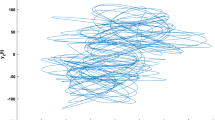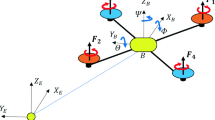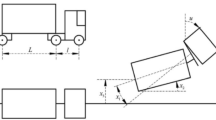Abstract
Keeping into view the human-brain-like capabilities, a novel adaptive control scheme utilizing a defuzzification module has been designed in an effort to endow the control systems with human-like capabilities of learning and processing human-understandable information. It’s been noted that within real-time systems, uncertain and undefined external disruptions can manifest in various ways due to their ambiguous and unpredictable nature. Consequently, attempting to encapsulate these disturbances within precise closed-form mathematical expressions is often impractical. Therefore, opting to describe such ambiguous and incomplete information using linguistic variables, as opposed to rigid mathematical formulations, is a more suitable approach. In this regard, a novel class of uncertain nonlinear systems in non-strict feedback involving fuzzy variables is introduced in which the fuzzy variables are used to express unknown disturbances. As a result, such class is systems become more general and human-interactable but alongside the control of such class of systems becomes more complicated and difficult. Therefore, the goal of this work is to provide an efficient intelligent control technique for the proposed class of systems which can successfully handle these uncertainties and attributes of fuzziness. The proposed control scheme is therefore consists of (a) a defuzzification module to handle fuzzy variables and (b) radial basis function neural network (RBFNN) to approximate the unknown functions. The existing category of uncertain systems is managed by converting the system into an n-step ahead predictor and applying the suggested control approach. By leveraging Lyapunov theory, it can be demonstrated that the comprehensive closed-loop system achieves semi-global uniform ultimate boundedness (SGUUB), and it is established that the error tends to diminish towards zero. Additionally, the computational complexity of the overall control scheme is also analyzed. The control scheme is validated through numerical simulations for its effectiveness and real-time applicability. A simulation example based on hypersonic flight dynamics model developed by NASA-Langley Research Centre for longitudinal dynamics of a hypersonic vehicle is used to demonstrate the scheme’s reliability and real-time applicability.







Similar content being viewed by others
Data availability
Data sharing is not relevant to this research because no new data were created or reviewed in this research.
References
Wang, G., and J. Qiao. 2021. An efficient self-organizing deep fuzzy neural network for nonlinear system modeling. IEEE Transactions on Fuzzy Systems 30 (7): 2170–2182. https://doi.org/10.1109/TFUZZ.2021.3077396.
Madsen, E., O.S. Rosenlund, D. Brandt, and X. Zhang. 2020. Comprehensive modeling and identification of nonlinear joint dynamics for collaborative industrial robot manipulators. Control Engineering Practice 101: 104462. https://doi.org/10.1016/j.conengprac.2020.104462.
Kumar, R., U. Pratap Singh, A. Bali, and K. Raj. 2022. Hybrid neural network control for uncertain nonlinear discrete-time systems with bounded disturbance. Wireless Personal Communications 126: 3475–3494. https://doi.org/10.1007/s11277-022-09875-9.
Luongo, A., M.J. Leamy, S. Lenci, G. Piccardo, and C. Touze. 2021. Advances in stability, bifurcations and nonlinear vibrations in mechanical systems. Nonlinear Dynamics 103 (4): 2993–2995.
Singh, A.P., D. Deb, H. Agrawal, and V.E. Balas. 2021. Modeling, Stability and Fractional Control of Single Flexible Link Robotic Manipulator. In Fractional Modeling and Controller Design of Robotic Manipulators, 83–98. Cham: Springer.
Kumar, R., U.P. Singh, A. Bali, and S. Jain. 2022. Neuro-fuzzy elman wavelet control for nonlinear uncertain systems with fuzzy input and unknown fuzzy disturbances: Application to robotics. International Journal of Adaptive Control and Signal Processing 36 (12): 2988–3003.
Pang, H., R. Yao, P. Wang, and Z. Xu. 2021. Adaptive backstepping robust tracking control for stabilizing lateral dynamics of electric vehicles with uncertain parameters and external disturbances. Control Engineering Practice 110: 104781.
Yang, Q., C.A. Sing-Long, and E. Reed. 2020. Rapid data-driven model reduction of nonlinear dynamical systems including chemical reaction networks using \(l^{1}\)-regularization. Chaos: An Interdisciplinary Journal of Nonlinear Science 30 (5): 053122.
Hao, R., H. Wang, S. Liu, M. Yang, and Z. Tian. 2021. Multi-objective command filtered adaptive control for nonlinear hydraulic active suspension systems. Nonlinear Dynamics 105 (2): 1559–1579.
Li, C., Y. Mao, J. Zhou, N. Zhang, and X. An. 2017. Design of a fuzzy-pid controller for a nonlinear hydraulic turbine governing system by using a novel gravitational search algorithm based on cauchy mutation and mass weighting. Applied Soft Computing 52: 290–305.
Bulín, R., Š Dyk, and M. Hajžman. 2021. Nonlinear dynamics of flexible slender structures moving in a limited space with application in nuclear reactors. Nonlinear Dynamics 104 (4): 3561–3579.
Aboelezz, A., O. Mohamady, M. Hassanalian, and B. Elhadidi. 2021. Nonlinear flight dynamics and control of a fixed-wing micro air vehicle: Numerical, system identification and experimental investigations. Journal of Intelligent & Robotic Systems 101 (3): 1–18.
Kumar, R., U.P. Singh, A. Bali, and S.S. Chouhan. 2023. It2-Neuro-Fuzzy Wavelet Network with Jordan Feedback Structure for the Control of Aerial Robotic Vehicles with External Disturbances. In Deep Learning and Other Soft Computing Techniques: Biomedical and Related Applications, 195–207. Cham: Springer.
Sun, J., Z. Pu, J. Yi, and Z. Liu. 2019. Fixed-time control with uncertainty and measurement noise suppression for hypersonic vehicles via augmented sliding mode observers. IEEE Transactions on Industrial Informatics 16 (2): 1192–1203.
Singh, P., et al. 2023. Ambiguous set theory: A new approach to deal with unconsciousness and ambiguousness of human perception. Journal of Neutrosophic and Fuzzy Systems 5 (1): 52–2.
Singh, P. 2023. An investigation of ambiguous sets and their application to decision-making from partial order to lattice ambiguous sets. Decision Analytics Journal 8: 100286.
Singh, P., and Y.-P. Huang. 2023. Membership functions, set-theoretic operations, distance measurement methods based on ambiguous set theory: A solution to a decision-making problem in selecting the appropriate colleges. International Journal of Fuzzy Systems 25: 1311–1326. https://doi.org/10.1007/s40815-023-01468-3.
Lagrat, I., H. Ouakka, I. Boumhidi, et al. 2006. Fuzzy sliding mode pi controller for nonlinear systems. WSEAS Transactions on Signal Processing 2: 1137–1143.
Feng, Z., Z. Zhang, D. Pi. 2004. Open-closed-loop pd-type iterative learning controller for nonlinear systems and its convergence. In: Fifth World Congress on Intelligent Control and Automation (IEEE Cat. No. 04EX788), vol. 2, pp. 1241–1245, IEEE.
Kim, J.-H., W.-C. Lee, and G.-T. Kang. 2003. Adaptive pid controller for nonlinear systems using fuzzy model. Journal of Korean Institute of Intelligent Systems 13 (1): 85–90.
Sakhre, V., U. Singh, and S. Jain. 2017. Fcpn approach for uncertain nonlinear dynamical system with unknown disturbance. International Journal of Fuzzy Systems 19 (2): 452.
Singh, U.P., and S. Jain. 2016. Modified chaotic bat algorithm based counter propagation neural network for uncertain nonlinear discrete time system. International Journal of Computational Intelligence and Applications 15 (03): 1650016.
Nekoukar, V., and N.M. Dehkordi. 2021. Robust path tracking of a quadrotor using adaptive fuzzy terminal sliding mode control. Control Engineering Practice 110: 104763.
Lin, Y.-C., V.E. Balas, J.-F. Yang, and Y.-H. Chang. 2020. Adaptive takagi-sugeno fuzzy model predictive control for permanent magnet synchronous generator-based hydrokinetic turbine systems. Energies 13 (20): 5296.
Tan, S., J. Hao, J. Vandewalle. 1993. Nonlinear systems identification using rbf neural networks. In: Proceedings of 1993 International Conference on Neural Networks (IJCNN-93-Nagoya, Japan), vol. 2, pp. 1833–1836, IEEE.
Kumar, R., S. Srivastava, and J. Gupta. 2017. Modeling and adaptive control of nonlinear dynamical systems using radial basis function network. Soft Computing 21 (15): 4447–4463.
Song, R., W. Xiao, Q. Wei, and C. Sun. 2014. Neural-network-based approach to finite-time optimal control for a class of unknown nonlinear systems. Soft Computing 18 (8): 1645–1653.
Wang, W., D. Wang, Z. Peng, and T. Li. 2015. Prescribed performance consensus of uncertain nonlinear strict-feedback systems with unknown control directions. IEEE Transactions on Systems, Man, and Cybernetics: Systems 46 (9): 1279–1286.
Ma, H., H. Li, R. Lu, and T. Huang. 2020. Adaptive event-triggered control for a class of nonlinear systems with periodic disturbances. Science China Information Sciences 63 (5): 1–15.
Kumar, R., U. Pratap Singh, A. Bali, and K. Raj. 2022. Hybrid neural network controller for uncertain nonlinear discrete-time systems with non-symmetric dead zone and unknown disturbances. International Journal of Control 96 (8): 2003–2011. https://doi.org/10.1080/00207179.2022.2080117.
Kumar, R., U.P. Singh, A. Bali, and K. Raj. 2022. Hybrid neural network control for uncertain nonlinear discrete-time systems with bounded disturbance. Wireless Personal Communications 126 (4): 3475–3494.
Bali, A., U. Pratap Singh, R. Kumar, and K. Raj. 2022. Hybrid neural network control for nonlinear continuous time systems with time delays and dead zone input. International Journal of Adaptive Control and Signal Processing 36 (6): 1439–1459. https://doi.org/10.1002/acs.3403.
Singh, U.P., and S. Jain. 2018. Optimization of neural network for nonlinear discrete time system using modified quaternion firefly algorithm: case study of Indian currency exchange rate prediction. Soft Computing 22 (8): 2667–2681.
Gil, P., T. Oliveira, and L. Palma. 2018. Adaptive neuro-fuzzy control for discrete-time nonaffine nonlinear systems. IEEE Transactions on Fuzzy Systems 27 (8): 1602–1615.
Chairez, I. 2012. Differential neuro-fuzzy controller for uncertain nonlinear systems. IEEE Transactions on Fuzzy Systems 21 (2): 369–384.
Song, S., J.H. Park, B. Zhang, X. Song, and Z. Zhang. 2020. Adaptive command filtered neuro-fuzzy control design for fractional-order nonlinear systems with unknown control directions and input quantization. IEEE Transactions on Systems, Man, and Cybernetics: Systems 51 (11): 7238–7249.
Cervantes, J., W. Yu, S. Salazar, and I. Chairez. 2016. Takagi-sugeno dynamic neuro-fuzzy controller of uncertain nonlinear systems. IEEE Transactions on Fuzzy Systems 25 (6): 1601–1615.
Lin, C.-M., T.-L. Le, and T.-T. Huynh. 2018. Self-evolving function-link interval type-2 fuzzy neural network for nonlinear system identification and control. Neurocomputing 275: 2239–2250.
Hung, L.-C., and H.-Y. Chung. 2007. Decoupled sliding-mode with fuzzy-neural network controller for nonlinear systems. International Journal of Approximate Reasoning 46 (1): 74–97.
Hsu, C.-F. 2007. Self-organizing adaptive fuzzy neural control for a class of nonlinear systems. IEEE Transactions on Neural Networks 18 (4): 1232–1241.
Liu, Y.-J., and S. Tong. 2014. Adaptive nn tracking control of uncertain nonlinear discrete-time systems with nonaffine dead-zone input. IEEE Transactions on Cybernetics 45 (3): 497–505.
Fei, J., and T. Wang. 2019. Adaptive fuzzy-neural-network based on rbfnn control for active power filter. International Journal of Machine Learning and Cybernetics 10 (5): 1139–1150.
Ge, S.S., J. Zhang, and T.H. Lee. 2004. Adaptive neural network control for a class of mimo nonlinear systems with disturbances in discrete-time. IEEE Transactions on Systems, Man, and Cybernetics, Part B (Cybernetics) 34 (4): 1630–1645.
Liu, Y., L. Liu, and S. Tong. 2014. Adaptive neural network tracking design for a class of uncertain nonlinear discrete-time systems with dead-zone. Science China Information Sciences 57 (3): 1–12.
Ge, S.S., C. Yang, and T.H. Lee. 2008. Adaptive predictive control using neural network for a class of pure-feedback systems in discrete time. IEEE Transactions on Neural Networks 19 (9): 1599–1614.
Guangbin, C., D. Guangren, H. Changhua. 2010. On some classes of control-oriented model of air-breathing hypersonic vehicles. In: 2010 Chinese Control and Decision Conference, pp. 2955–2960, IEEE.
Ataei-Esfahani, A., Q. Wang. 2007. Nonlinear control design of a hypersonic aircraft using sum-of-squares method. In: 2007 American Control Conference, pp. 5278–5283, IEEE.
Xu, B., D. Yang, Z. Shi, Y. Pan, B. Chen, and F. Sun. 2017. Online recorded data-based composite neural control of strict-feedback systems with application to hypersonic flight dynamics. IEEE Transactions on Neural Networks and Learning Systems 29 (8): 3839–3849.
Acknowledgements
This work was supported by MATRICS project Grant No. MTR/2021/000478 from 548 the Science and Engineering Research Board (SERB), India.
Author information
Authors and Affiliations
Corresponding author
Additional information
Communicated by S. Ponnusamy.
Publisher's Note
Springer Nature remains neutral with regard to jurisdictional claims in published maps and institutional affiliations.
Rights and permissions
Springer Nature or its licensor (e.g. a society or other partner) holds exclusive rights to this article under a publishing agreement with the author(s) or other rightsholder(s); author self-archiving of the accepted manuscript version of this article is solely governed by the terms of such publishing agreement and applicable law.
About this article
Cite this article
Kumar, R., Singh, U.P., Bali, A. et al. Adaptive control of unknown fuzzy disturbance-based uncertain nonlinear systems: application to hypersonic flight dynamics. J Anal 32, 1395–1414 (2024). https://doi.org/10.1007/s41478-023-00687-z
Received:
Accepted:
Published:
Issue Date:
DOI: https://doi.org/10.1007/s41478-023-00687-z
Keywords
- Adaptive control
- Nonlinear uncertain systems
- Lyapunov stability
- Fuzzy external disturbances
- Hypersonic flight dynamics
- NASA-LRC model




